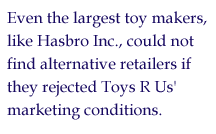
|
Courts Rule Against Toys R Us
|
 A federal appeals court on Tuesday ruled against the nation's largest toy retailer, finding Toys R Us Inc. had acted illegally to raise competitors prices and reduce competition. A federal appeals court on Tuesday ruled against the nation's largest toy retailer, finding Toys R Us Inc. had acted illegally to raise competitors prices and reduce competition.The unanimous decision by a three-judge panel in Chicago was a major victory for the Federal Trade Commission which had first brought the charges in 1996. The U.S. Court of Appeals for the Seventh Circuit rejected the company's challenge of the FTC's findings and its order to halt practices which the agency charged had led toy makers to deny their most popular products to discount shopping clubs. ``We conclude that the commission's decision is supported by substantial evidence on the record, and that its remedial decree falls within the broad discretion it has been granted under the FTC Act,'' said Judge Diane Wood in the opinion. The Paramus, N.J.-based company did not return calls seeking comment. FTC Chairman Robert Pitofsky hailed the decision as an important reaffirmation of antitrust law with broader implications for Internet retailing. ``I think it restores some principles that people had begun to doubt,'' he told Reuters. ``This case involved price clubs but the implication for the future has to do with traditional distributors precluding e-commerce from challenging their entrenched position,'' Pitofsky said. The FTC held that Toys R Us had used its dominance to force major toy manufacturers to sell only so-called ``value packs'' of several toys or discontinued items to discount shopping clubs like Costco and Pace. Those practices prevented consumers from comparing price and quality of products and curtailed the effectiveness of the clubs as competitors, the FTC charged.  FTC Administrative Law Judge James Timony heard the case and backed action against Toys R Us in a 1997 decision. FTC Commissioners voted 4-0 to uphold Timony's opinion in 1998, leading to the appeals court challenge by the company. FTC Administrative Law Judge James Timony heard the case and backed action against Toys R Us in a 1997 decision. FTC Commissioners voted 4-0 to uphold Timony's opinion in 1998, leading to the appeals court challenge by the company.
The appeals court said Toys R Us had argued that it lacked the muscle to force its toy suppliers to change their market arrangements with the price clubs. But the court said Toys R Us was ``a giant in the toy retailing industry,'' selling one in five toys sold in the United States. Even the largest toy makers, like Hasbro Inc., could not find alternative retailers if they rejected Toys R Us' marketing conditions. ``Taking steps to prevent a price collapse through coordination of action among competitors has been illegal'' at least since 1940, the opinion said. In related news, Toys R Us has announced plans to build the world's largest toy store, a 101,000-square-foot emporium with a life-size dollhouse and a 60-foot-tall Ferris wheel in Times Square. The three-story glass-enclosed store, which would become the company's flagship, is scheduled to open next summer, said John Eyler, the company's chief executive officer. ``We expect it to draw over 20 million visitors a year - that's two and a half times more people than visit the Empire State Building, the Statue of Liberty and Ellis Island combined,'' Eyler said Tuesday. The store would join a host of family-oriented theme restaurants and corporate stores that have opened in Times Square in recent years. Its neighbors would include the WWF Store, the ESPNZone restaurant and the Disney Store. Sources: Associated Press, Rueters [Posted 8/02/2000]
  
|









